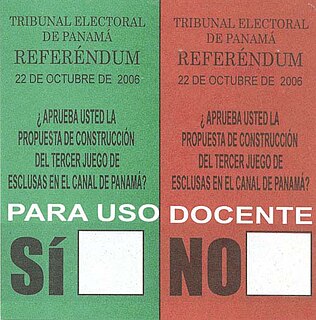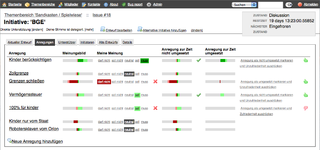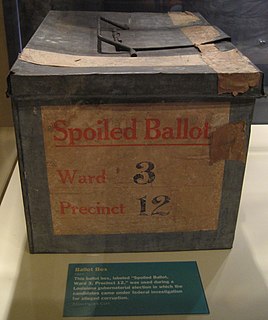 W
WVoting is a method for a group, such as a meeting or an electorate, in order to make a collective decision or express an opinion usually following discussions, debates or election campaigns. Democracies elect holders of high office by voting. Residents of a place represented by an elected official are called "constituents", and those constituents who cast a ballot for their chosen candidate are called "voters". There are different systems for collecting votes, but while many of the systems used in decision-making can also be used as electoral systems, any which cater for proportional representation can only be used in elections.
 W
WBlackballing is a rejection in a traditional form of secret ballot, where a white ball or ballot constitutes a vote in support and a black ball signifies opposition. The system is typically used where an organization's rules provide that one or two objections, rather than an at-least-50% share of votes, are sufficient to defeat a proposition. Since the seventeenth century, these rules have commonly applied to elections to membership of many gentlemen's clubs and similar institutions such as Masonic lodges and fraternities.
 W
WIn political science and sociology, a cleavage is a historically determined social or cultural line which divides citizens within a society into groups with differing political interests, resulting in political conflict among these groups. Social or cultural cleavages thus become political cleavages once they get politicized as such. Cleavage theory accordingly argues that political cleavages predominantly determine a country's party system as well as the individual voting behavior of citizens, dividing them into voting blocs. It is distinct from other common political theories on voting behavior in the sense that it focuses on aggregate and structural patterns instead of individual voting behaviors.
 W
WCompulsory voting, also called mandatory voting, is the requirement in some countries that eligible citizens register and vote in elections. Penalties might be imposed on those who fail to do so without a valid reason. According to the CIA World Factbook, 21 countries, including 10 Latin American countries, officially had compulsory voting as of December 2017, with a number of those countries not enforcing it.
 W
WElection forensics are methods used to determine if election results are statistically normal or statistically abnormal, which can indicate electoral fraud. It uses statistical tools to determine if observed election results differ from normally occurring patterns. These tools can be relatively simple, such as looking at the frequency of integers and using 2nd Digit Benford's law, or can be more complex and involve machine learning techniques.
 W
WA voter identification law is a law that requires a person to show some form of identification in order to vote. In many jurisdictions requiring voter IDs, voters who do not have photo ID often must sign a Challenged Voter Affidavit in order to receive a ballot to vote.
 W
WLiquidFeedback is free software for political opinion formation and decision making, combining aspects of representative and direct democracy. Its most important feature is the implementation of a delegated voting system which is to establish a new form of political representation and participation that takes into account the knowledge disparity of its participants. The software offers much promise but also faces many threats.
 W
WA poll card is a document which is sent to all registered voters by the returning officer shortly before an election in the United Kingdom. The poll card gives information about the election, such as the date of the election, the location and opening times of the voter's polling station, and the name, address and electoral number of the voter.
 W
WPostal voting is voting in an election where ballot papers are distributed to electors by post, in contrast to electors voting in person at a polling station or electronically via an electronic voting system.
 W
WA protest vote is a vote cast in an election to demonstrate dissatisfaction with the choice of candidates or the current political system. Protest voting takes a variety of forms and reflects numerous voter motivations, including political alienation.
 W
WThe right of foreigners to vote in Switzerland is an ongoing political issue in the country. Switzerland is a federal nation. As such, the cantons have extensive powers to enact their own legislation. For this reason, the rules regarding the rights of foreign residents to vote differ considerably throughout Switzerland.
 W
WThe secret ballot, also known as the Australian ballot or Massachusetts ballot, is a voting method in which a voter's identity in an election or a referendum is anonymous. This forestalls attempts to influence the voter by intimidation, blackmailing, and potential vote buying. This system is one means of achieving the goal of political privacy.
 W
WA voter invitation card, or voter notification card, or notice of election card, is an informational leaflet, usually of the size of a postcard, which requests voters to attend the elections and which generally contains information regarding elections, place and time of voting, and contact details of the electoral commission. Having certain artistic and undoubtedly historic merits, invitations to vote are collectibles.
 W
WIn political science, voter turnout is the percentage of eligible voters who participated in an election. Eligibility varies by country, and the voting-eligible population should not be confused with the total adult population.
 W
WA voting booth or polling booth is a room or cabin in a polling station where voters are able to cast their vote in private to protect the secrecy of the ballot. Commonly the entrance to the voting booth is a retractable curtain. Usually access to the voting booth is restricted to a single person, with exceptions for voters requiring assistance. The booths aren't in all states but some, as others use a form of mailing.
 W
WMany people have cast votes during spaceflight. Voting from space has some inherent difficulties, as delivering paper ballots to and from a space station—as one would do for a soldier stationed overseas—would be cost prohibitive. Some astronauts vote electronically, while others communicate their voting intentions to a proxy.
 W
WVoting rights in the United States, specifically the enfranchisement and disenfranchisement of different groups, has been a moral and political issue throughout United States history.